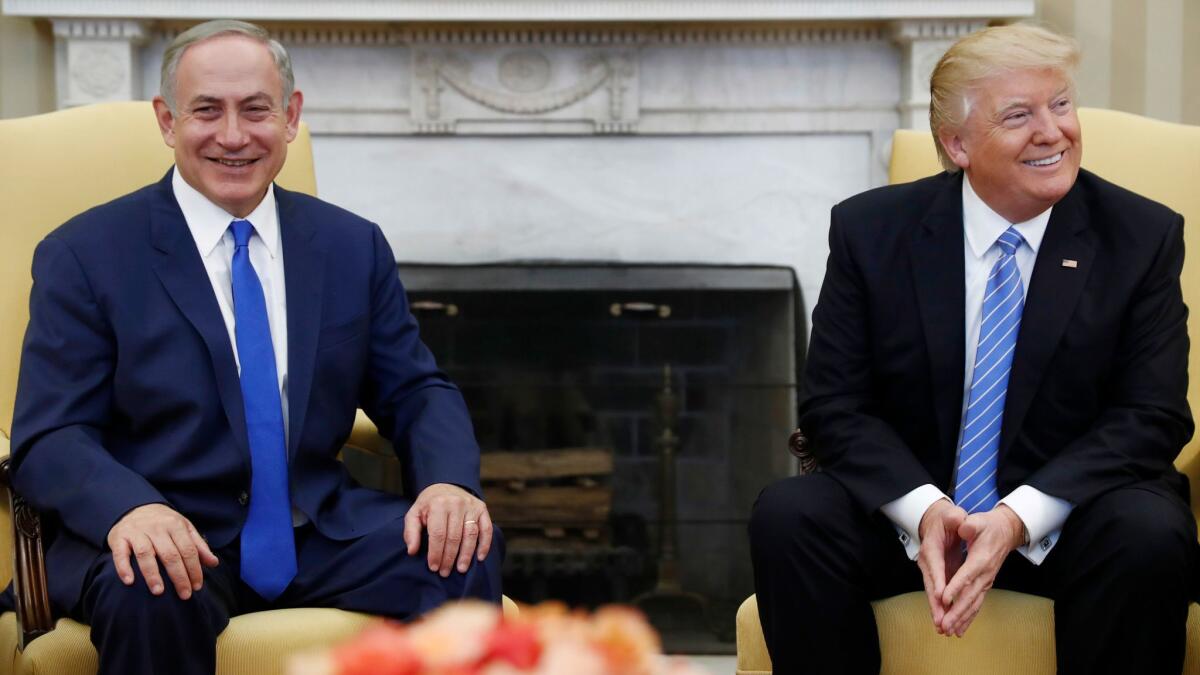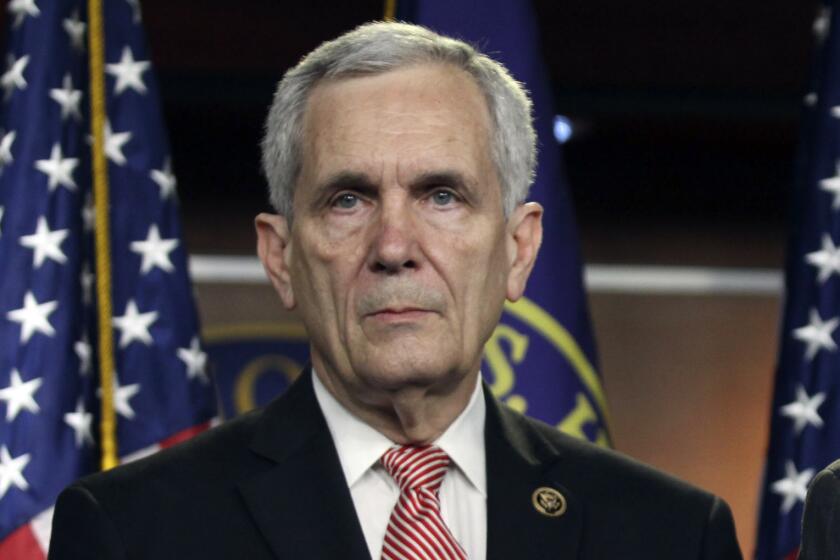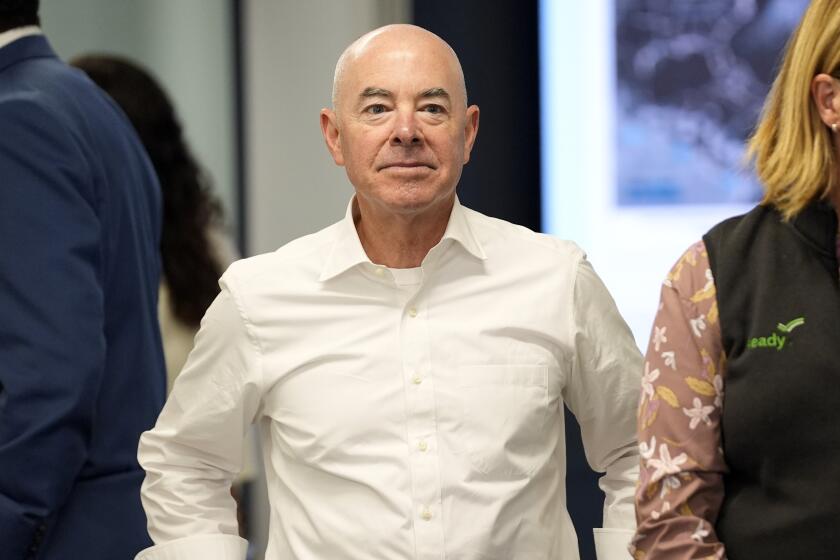In Arab world, fresh doubts about the chances for a Palestinian state

Four years ago, the West Bank city of Ramallah rejoiced when the United Nations voted to recognize a Palestinian state – a symbolic move, surely, but seen at the time by many as a hopeful step on the road to self-determination.
Now few in the city believe that the new U.S. administration will help advance the cause of Palestinian statehood, and that doubt is echoed across much of the Arab world.
“The people are very confused,” said Somida Abbas, a 58-year-old Palestinian insurance executive sitting in a café on Ramallah’s main square. “I’m sure that I will not ever live to see a Palestinian state now.”
There was little surprise over the deliberate show of bonhomie Wednesday at a joint White House appearance by Israeli Prime Minister Benjamin Netanyahu and President Trump, who throughout his campaign had signaled willingness to break with decades of U.S. policy.
But many in the Palestinian territories, and across the region, were shaken by the president’s almost casual dismissal of the longstanding U.S. commitment to the eventual creation of a Palestinian state, a diplomatic bedrock known as the two-state solution.
“I’m looking at two-state and one-state, and I like the one that both parties like,” Trump told reporters at a news conference by the two leaders. “I can live with either one.”
A single state encompassing both Israelis and Palestinians has long been viewed as an unsatisfactory solution to the Mideast conundrum. By absorbing the West Bank and a Palestinian population roughly equal to its own, Israel would be confronted with the choice of either sacrificing its Jewish character or -- if it relegated Palestinians to second-class stature without full citizenship rights -- its democracy.
Some longtime observers of the region said Trump’s stance lacked the gravitas of past policymaking efforts.
“It’s hard to even have a serious conversation based on ‘I’m fine with whatever you guys agree to,’” said Mouin Rabbani, a senior fellow at the Washington-based Institute for Palestine Studies.
Speaking by phone from Amman, Jordan, Rabbani said that when the president makes such a seemingly off-the-cuff remark, “you take it seriously at your peril, and you ignore it at your peril.”
Even with no peace talks in sight, the prospect of a U.S. retreat on commitment to Palestinian statehood threatens to undermine the stability of the already struggling Palestinian Authority, the Palestinian self-governing body set up after the 1993 Oslo Accords.
The new CIA director, Mike Pompeo, was in Ramallah the same day as the Trump-Netanyahu meeting and reportedly got an earful from Palestinian officials about the danger of extremists being emboldened by the U.S. pullback from a commitment to Palestinian statehood.
“The lack of attention to the Palestinian side…should alarm the Palestinian Authority,” Nabil Amr, a former Palestinian government minister, told Palestinian radio Thursday. “It is obvious that there will be no pressure exerted on Netanyahu.”
Some regional analysts poured cold water on the notion that warming ties with some Sunni Arab states – due to a common threat posed by jihadist groups and the ambitions of Shiite Muslim Iran – could lead to any meaningful Arab engagement in a peace bid.
Jared Kushner, the Trump son-in-law touted by the president as a potential Mideast dealmaker, has been making Arab-world contacts thought to be aimed at laying the groundwork for drawing regional powers such as Saudi Arabia into Israeli-Palestinian peacemaking. That idea dates to at least the early 1990s, but has never moved forward.
At the White House news conference, Netanyahu made a point of referring to a changing relationship with Arab states other than Jordan and Egypt, with which Israel has peace treaties.
“We can seize an historic opportunity because for the first time in my lifetime and for the first time in the life of my country, Arab countries in the region do not see Israel as an enemy, but increasingly as an ally,” the Israeli leader said.
But conservative Gulf monarchies, mindful of domestic constituencies, are seen as highly unlikely to step up without significant Israeli concessions, which do not appear on the horizon as long as Netanyahu’s right-wing government is in power.
None of those states has formal diplomatic ties with Israel, and would almost certainly seek to keep any dealings “covert and compartmentalized,” Rabbani said. Few Gulf governments, he said, would want to stake their prestige on a peace process that was not aimed at culminating in Palestinian statehood.
“There is a strong Israeli interest in bringing countries like Saudi Arabia – plus Egypt and Jordan – into the fold,” said Yossi Mekelberg, an associate fellow at the British think tank Chatham House. “If you want to go for a big move and reach the region involved, at the end of the day it is the Israelis who need to deliver the minimum requirements.”
Jerusalem Post columnist Gershon Baskin said on Twitter that if there were a U.S. push to seek an Arab-brokered plan, the Trump administration would realize “after five minutes of talks with Arab states that there is no regional peace without two states” – Israel and Palestine.
Saudi Arabia, for its part, made no public move to leap into the diplomatic breach. Saudi Foreign Minister Abdel Jubeir, attending the G-20 meeting in Bonn a day after the Trump-Netanyahu meeting, said little about the U.S. stance on Palestinian statehood other than that the kingdom looked forward to working with the new administration.
“We are very, very optimistic about our ability to resolve issues in the region,” he said.
Many Arab governments, even Western-friendly ones, have long been cynical about successive U.S. administrations’ attempts to broker a peace between Israelis and Palestinians, feeling that such efforts were doomed by a failure to press Israel to take steps like halting the building of settlements in the West Bank and east Jerusalem.
In his joint news conference with Netanyahu, Trump raised the subject, but only gingerly, telling the Israeli leader, “I’d like to see you hold back on settlements for a little bit. We’ll work something out.”
Palestinian officials said the mild admonition on settlement-building, coupled with the lack of commitment to a two-state goal, left them with little hope of a breakthrough.
Hanan Ashrawi, a senior official in the Palestine Liberation Organization, evoked a phrase used by Trump advisor Kellyanne Conway, who in January referred to “alternative facts” during an interview.
“I don’t know if President Trump can afford to drop the two-state solution and claim to want peace,” she said. “He’s dealing with alternative realities.”
In Ramallah, café waiter Mohammed Alawi had little to offer but a sarcastic smile when asked about the White House parley.
“I didn’t expect anything from them,” he said.
Special correspondent Mitnick reported from Ramallah and Times staff writer King from Washington.
More to Read
Start your day right
Sign up for Essential California for news, features and recommendations from the L.A. Times and beyond in your inbox six days a week.
You may occasionally receive promotional content from the Los Angeles Times.






